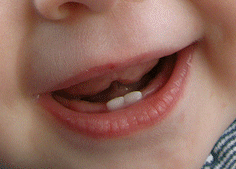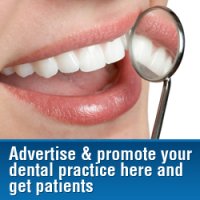
Child's First Dental Visit
The first visit of the child to a dentist office can be extremely important for the child's future dental health.
As parents, you should never delay the first dental visit until your child has a dental problem.
When to make your child's First Dental Visit
Pediatric dentists recommend that your child's first visit to the dentist office should be made after the first baby tooth erupts and before the first birthday, whatever comes first.
Unfortunately, the average age for a child’s first dentist visit ranges from three to five. Tooth decay may appear just after the eruption of the very first tooth. Baby bootle tooth decay is the most common cause of dental caries in this age. The average child has three decayed teeth by the age of 3. Studies show that children who visit the dentist before the age of one require 40% less dental expense during the first five years of life.
If you observe any signs of tooth decay on your baby's teeth, you should visit the dentist immediately.
What kind of dentist should my child see?
Find a dentist with experience in children, or a specialist pediatric dentist (pedodontist). Many general dentists treat children, as well as adults. But if the child proves to be non cooperative, they will usually refer you to a pedodontist.
Pediatric dentists have 2 to 3 years of specialty training following dental school, in dealing not only with children's dental problems but also managing their behavior. A pediatric dentist limits his/her practice to treating children only.
In difficult cases of non cooperative children or for complicated dental procedures, a pedodontist may place the child under dental sedation to perform the procedure.
Prepare for the first dental visit
Your child's first dental visit can be crucial for his/her future as a good dental patient.
- Do NOT scare the child
- The parents have to prepare the child before the first dentist visit about what will happen at the dental office. Present it as a new place for exploration and making new friends. Do not use phrases like "don't be afraid" or bribe the child with special treats, because it could make the child suspicious.
- It is important not to transfer your anxieties about the dentist to your child. In some cases it is better to leave the child alone with the dentist, so that he can build a relationship of trust with the child. The behavior of children on the dental chair depends largely on the child's trust to the dentist.
- If your child is too frightened, uncomfortable or uncooperative, it is better to spend this first dentist visit on having the child get familiar with the dentist and the dental office environment and equipment. When it relaxes, do not try to proceed to the examination but reschedule for the day after.
- It is recommended that you find a dentist even before your child is born. The dentist will advice you about dental health matters you have to take care before your child's first visit to the dentist.
What to expect on the first dental visit?
During this first dental visit the dentist will :
- Check for tooth decay or other dental problems. The purpose of the first dentist visit's examination is both to observe any problems and to establish a baseline so that the dentist can monitor the child's growth and development.
- Advise the parents about the child's dental hygiene and problems like thumbsucking, nursing baby bottle tooth decay....
- Get the child used with the dental office environment and the dentist.
For older children (>3yrs) the dentist will :
- Identify the child's fluoride needs and recommend any fluoride supplements if needed.
- Help the child build a lifetime of good dental habits by teaching the importance of oral hygiene and how to take care of teeth .
Preventive dental visits should be made every six months so that children get used to visiting the dentist regularly and any decay can be discovered and treated early.


